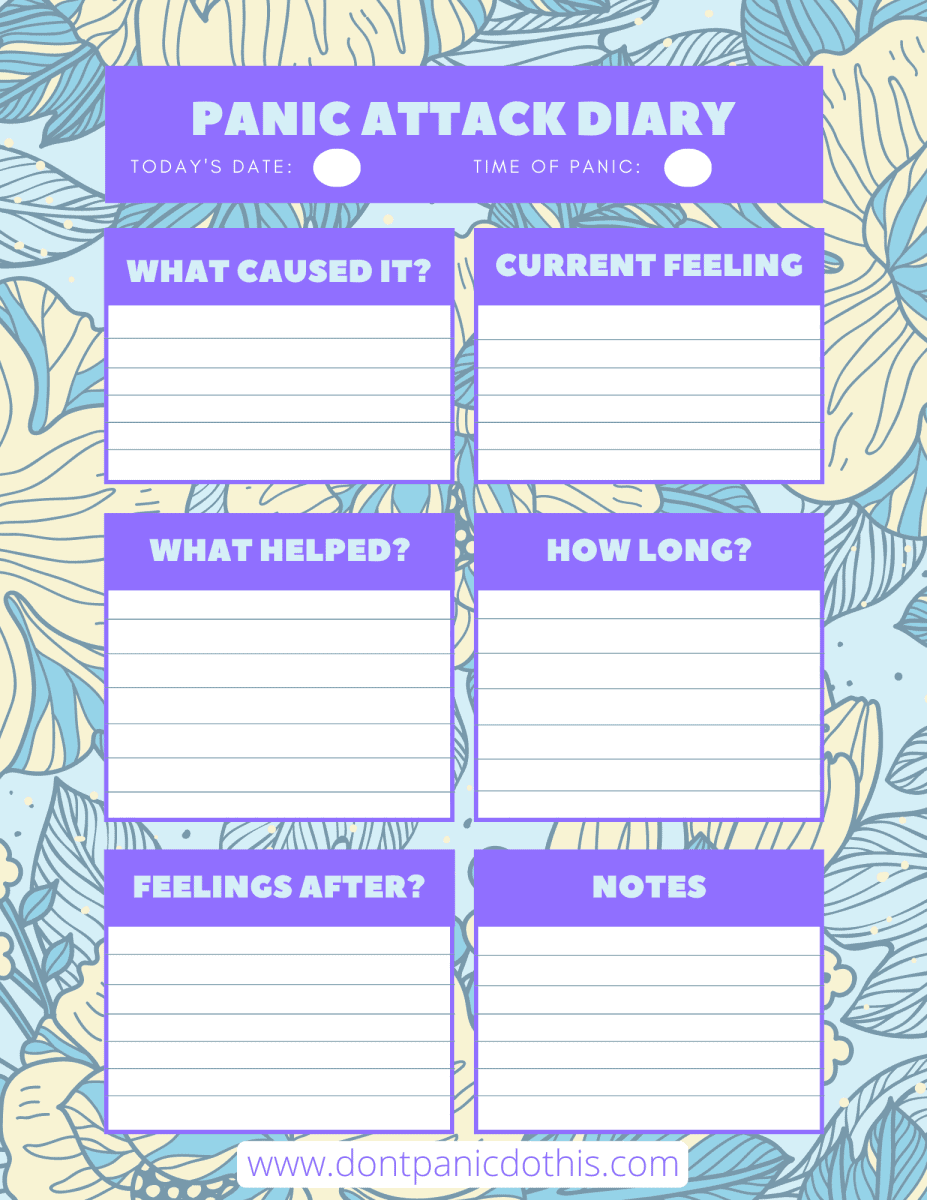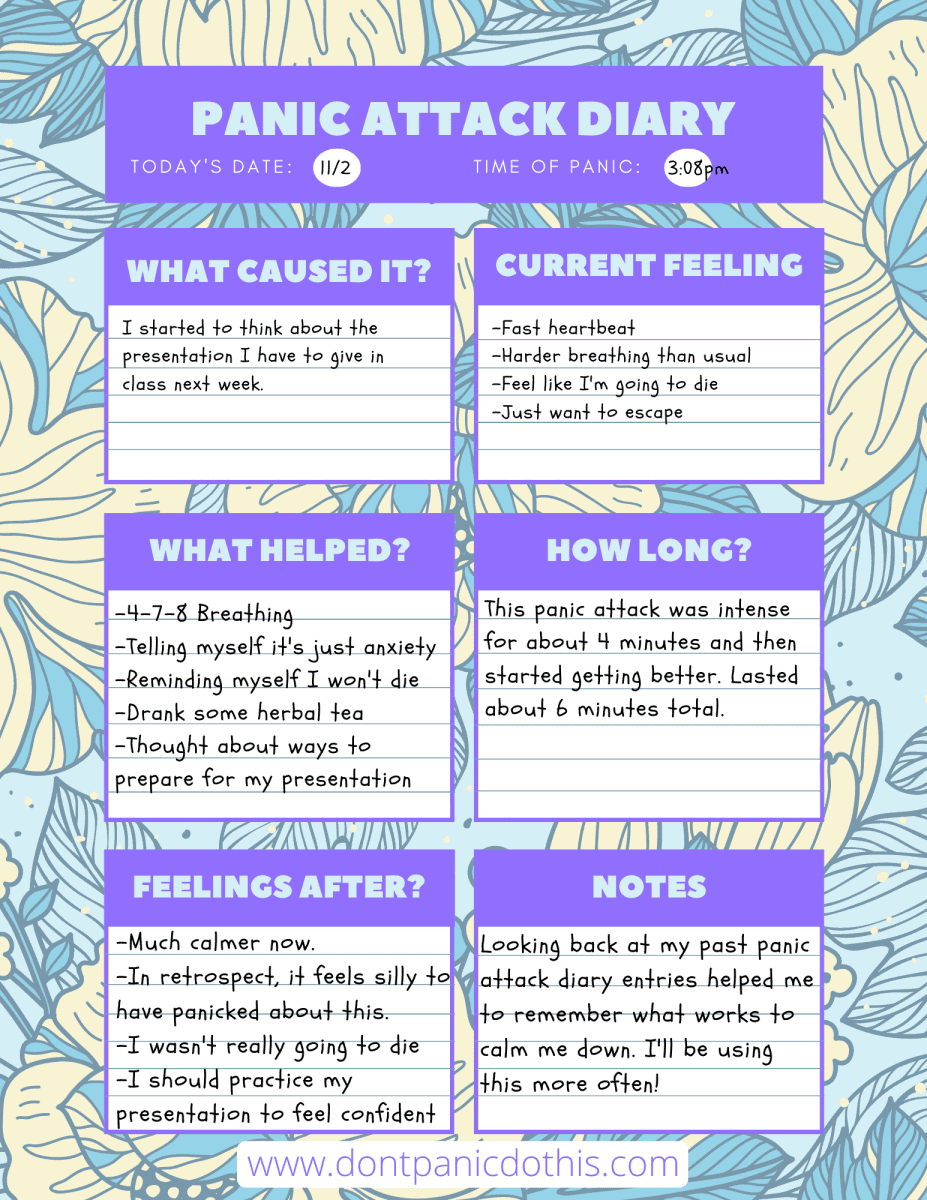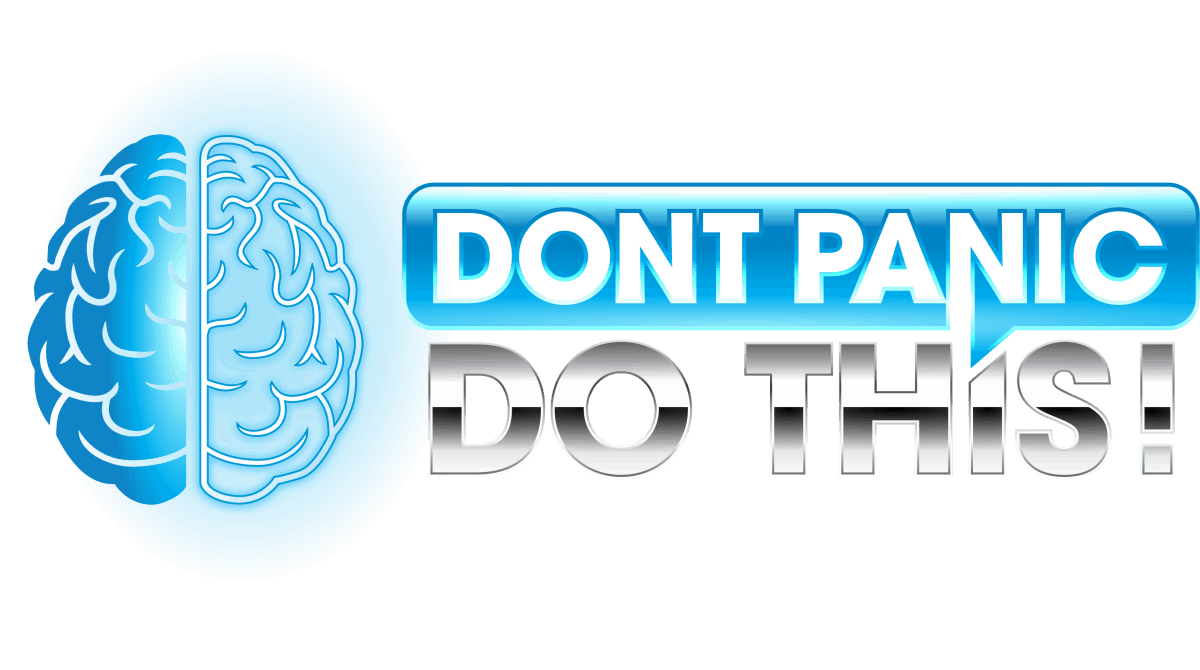Journaling is a great coping mechanism for anxiety, as it helps us to better visualize and understand our subconscious emotions. By using a panic attack diary regularly, you can learn to recognize triggers, patterns, and solutions to your anxiety. The perfect panic attack diary template should include:
- Date and time of day
- What caused your panic attack?
- What are you feeling right now?
- What helped your panic attack subside?
- How long did your panic attack last?
- How do you feel after your panic attack?
- Additional Notes
If this feels a bit overwhelming, don’t stress. Later in this article I’ll provide you with the best free panic attack diary template possible!
But first, let’s talk just a bit more about the benefits of journaling for stress and anxiety.
Benefits of Journaling (in General)
In general, journaling is a great habit to have for a number of reasons.
To name a few benefits of journaling:
- Captures Thoughts and Ideas in Writing Before You Forget Them
- Keeps Your Thoughts More Organized
- Easier to Track, Measure, and Reflect on Goals
- Can Help You to Become a Better Writer
- Serves as an Effective Stress Coping Mechanism
- It Can Be a Visual Representation of Your Thoughts
- May Improve Memory Over Time
- Increases Creative Thinking Ability
Whether a person has anxiety or not, journaling can be a useful addition to their daily routine.
Journaling for Stress and Anxiety
While journaling in general is great, let’s talk about why you’re really here.
Journaling for stress and anxiety can bring about even greater benefits:
- A stress journal, or panic attack diary, helps us to think more introspectively and critically. This process can help us dig up and understand more complex or subconscious thoughts. Journaling for stress and anxiety allows you to get your thoughts out of your head and onto paper.
- Expressing how we are feeling emotionally is a process called affect labeling, which has been shown to decrease physiological symptoms of anxiety. (source)
- Studies have found expressive writing to have a benefit on decreasing anxiety. This effect was most profound in young adults who were highly emotionally expressive. (source)
- By keeping a stress diary or panic attack diary, we can better keep track of our triggers, coping mechanisms, and progress. We can get a better understanding of our anxiety and what makes it better or worse. Over time, we can look back at older entries to see how we’ve improved and remind ourselves that we’ve gotten through panic attacks before.
The Best Free Panic Attack Diary Template
If you’re just looking into journaling for anxiety for the first time, it can be tough to know how to start. After all, choosing the right anxiety journaling prompts can be difficult.
I wanted to make this process a bit easier for you. I’ve created what I consider to be the best free panic attack diary template available online. Feel free to print this panic attack diary template out, or recreate your own with a pen and paper:

What makes this a great panic attack diary template is the carefully selected anxiety journaling prompts. Let’s explore what makes each prompt so important:
Date and Time of Day
While the date and time of day may seem inconsequential at first, they’re actually important to keep track of. By keeping track of the date and time, you can learn which day of the week or time of day you’re more likely to suffer from a panic attack. This is valuable information for anyone trying to figure out the cause of their panic attacks.
Additionally, this information will come in handy in the future. Weeks, months, or even years from now, it may be helpful to look back at your anxiety history. This can serve as a reminder of how far you’ve come, and that you’ve dealt with panic attacks before and can do it again.
What Caused Your Panic Attack?
Perhaps you’ve already read our articles on what causes anxiety, or on what causes panic attacks. If you have, you’ll already know that many triggers exist for panic attacks and anxiety.
While these triggers can sometimes be obvious, other times they are trickier to pin down. When the latter is the case, it can be helpful to have some data at our fingertips. By tracking what you were doing before or during your panic attack, it’s easier to determine the cause.
Did you eat a certain food just before your panic attack? (allergies, high sugar, etc.)
Were you thinking about a particularly stressful subject or situation? (job interview, date, etc.)
Maybe you felt overly aware of a specific bodily function? (heartbeat, breathing, etc.)
Even if the cause isn’t obvious at first, it’s important to write down any details that you think could be relevant. Down the road, you’ll be able to compare these diary entries to determine any possible causes of anxiety.
What Are You Feeling Right Now?
You should try and write down how you’re feeling during your panic attack. The best time to do this is, ironically, probably during the panic attack itself. This may seem scary, but it will help you to be fully aware of how you are feeling.
Is your heart pounding? Are you breathing rapidly? Do you feel like you’re going to die or are going crazy? Can you feel your fingers tingling?
Whatever it is you’re feeling or thinking, write it down. This process in and of itself can help provide some anxiety relief. It will also help you to understand your panic attacks better. During panic attacks we tend to think irrationally and forget that we’ve experienced these symptoms before. Looking back at past panic attack diary entries can remind us that we’ve been here before, and we’ve gotten through it.
What Helped Your Panic Attack Subside?
Here’s one point you definitely don’t want to miss in your panic attack diary – what helped your panic attack subside?
- Did you use a specific coping mechanism for anxiety like 478 breathing or meditation?
- Were you thinking a certain thought like reminding yourself that it would pass harmlessly?
- Perhaps you made yourself a cup of herbal tea, talked to a friend, or took a supplement?
Even if the thing that helped you once doesn’t help you all the time, it’s still useful to know. This helps you better understand which cues your brain associates with calmness and relaxation. Over time, you can use this information to develop your own sort of “calming ritual.”
How Long Did Your Panic Attack Last?
You should always try to record how long your panic attack lasted in your panic attack diary. Of course, this may be difficult to keep track of in the heat of the moment. Nonetheless, if you can even give it a “best guess,” this can be valuable data.
Firstly, it can be hard to notice the small improvements that occur over time. Even if your panic disorder (or other anxiety disorder) isn’t cured overnight, every small victory counts. It’s possible that by tracking your panic attacks you’ll notice when they get shorter over time. Conversely, you may notice them getting worse after certain negative lifestyle changes.
The second benefit of this is being able to remind yourself that every panic attack is temporary. It’s easy to forget this when we’re in “fight or flight mode” during a panic attack. Not only have you survived every panic attack you’ve ever had; every one of them was temporary. You may feel like you’ll feel this way forever, but you won’t. Look back at old entries and remember how short-lasted panic attacks really are. Every panic attack will stop at some point. I promise.
How Do You Feel After Your Panic Attack?
After your panic attack, you may feel relieved enough to put down your anxiety journal and call it a day. However, you should really try to write down how you are feeling after your panic attack. This can range greatly from person to person and panic attack to panic attack.
Many people report feeling fatigued and tired after their panic attacks. I’ve always had a tendency to feel extremely relaxed and relieved. More importantly, I’ve always found humor in the moments after a panic attack; I think, “Wow, I was really acting pretty crazy there. I was never in any danger at all! What was I thinking?”
You may feel differently after your panic attacks, but nonetheless, write these feelings down. It may not seem helpful now, but this post-panic clarity can be useful in the future. During your next panic attack, you’ll be able to look back and realize how silly anxiety can seem afterward. This realization may help put things in perspective and shorten the duration of your panic attack.
Additional Notes
Here’s a section where you can write down absolutely anything else that comes to mind.
Did you have any sort of moment of clarity or revelation that could be helpful for next time? Anything of note that wasn’t already included in this panic attack diary template?
Write it down!
Example of Completed Panic Attack Diary Entry
Feel free to use the provided panic attack diary template however you like.
Here’s a quick example of what kinds of things you may wish to be writing in it:




Tips for Your Panic or Stress Diary
- After writing these journal entries down, you can decide if you want to keep them or destroy them. My personal recommendation is to keep them, as they hold a lot of useful information that can be used in the future. Some people may prefer a greater degree of privacy and wish to destroy them. If you prefer this, that’s okay; writing about our worries or negative thoughts and destroying them can be cathartic.
- Don’t feel the need to write in your panic attack journal every single day. When a panic attack comes, write about it the best you can. If you miss a few, no big deal. You can derive benefits from anxiety journaling even just occasionally.
- Look back at your past entries from time to time. Try and appreciate any improvements or insights you’ve gained over time. Also, always be on the lookout for patterns. This can be extremely useful for helping you beat panic attacks over time.


